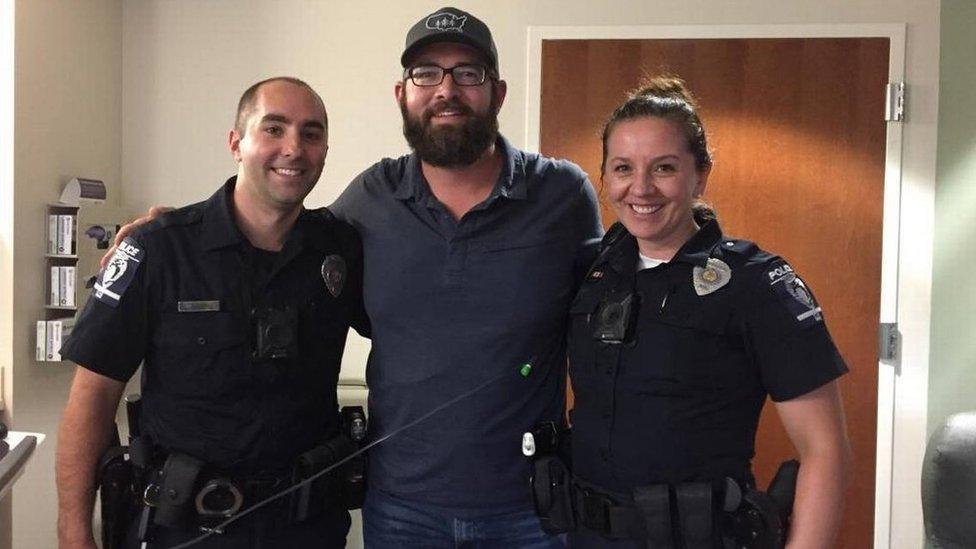North Carolina man cheats death after 40 minutes with no pulse
- Published

John Ogburn with the police officers who saved him, Lawrence Guiler (L) and Nikolina Bajic
A North Carolina man whose heart stopped for about 40 minutes has paid tribute to the emergency workers who brought him back from the dead.
John Ogburn, 36, suffered a cardiac arrest while working on his laptop near his Charlotte home on 26 June.
Two police officers who happened to be nearby began CPR on the father-of-three within a minute of the 911 call.
They took turns resuscitating Mr Ogburn for around 42 minutes until his pulse returned.
Charlotte-Mecklenburg police officers Lawrence Guiler and Nikolina Bajic's lifesaving efforts are all the more praiseworthy given that emergency workers are not required to perform CPR after 20 minutes without any vital signs.
'I'm doing really well'
After Mr Ogburn was brought to hospital, doctors placed him in a medically induced coma to help him recover for the rest of the week.
He has been advised not to drive for six months and is easing back into work.
But for the most part, he says he feels completely fine, apart from a sore chest.
"My energy level hasn't been what it was before, but that might be because my routine changed a bit," he told the BBC.
"The combination of [the chest compressions and an internal defibrillator] is a little sore, but if that's all I got to complain about, then I'm doing really well."
Mr Ogburn said he is still figuring out how to make the most of his second chance at life.
Above all he feels indebted to the first responders who went above and beyond the call of duty to make each new day possible for him.
"In certain time frames they're supposed to call it, and they didn't, they continued to try to save me," he said. "And I am just so grateful for that and for them."

Golden minutes
Dr Michael Kurz, associate professor at the University of Alabama at Birmingham School of Medicine, and American Heart Association volunteer, says: "The evidence does tell us that for every minute the heart is stopped and that high-quality cardiopulmonary resuscitation (CPR) is not conducted, there is a 10% reduction in survival.
This case in North Carolina highlights the value of CPR in extending that window of survivability. Immediate CPR can double or treble chances of survival from cardiac arrest. Most US employees are not prepared to handle cardiac emergencies, and that needs to change."
More than 350,000 out-of-hospital cardiac arrests occur in the US each year, with 90% of those victims dying as a result. Just 46% of people who experience cardiac arrests outside of hospital receive any form of help before professional paramedics arrive.